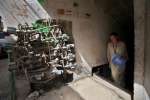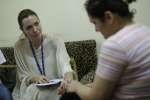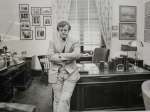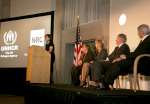Resettlement offers American Dream to Syrian refugees
News Stories, 3 December 2015
AMMAN, Dec 3 (UNHCR) – As Mahmoud sorts through his few belongings in preparation for a fresh start in the United States of America, one thing above all symbolizes the life he left behind in Syria and the new life he hopes to build stateside – his chef's uniform.
The father of four used to own a popular restaurant with his brother in Homs, but in late 2011 as the fighting in western Syria intensified, he was forced to close down and flee to neighbouring Jordan after the family business and his home were damaged by shell fire.
Life as refugees for the past four years has been hard for Mahmoud, 36, and his young family. Unable to work legally, he has struggled with financial hardship and lost hope that their situation will improve. "We're not doing well. It's not a stable life for the children, and we don't see a future here," he says.
It was a phone call in 2013 that offered hope of an alternative future, when UNHCR informed Mahmoud that he and his family were being considered for resettlement to the United States of America. After an application process that has lasted more than two years, the family is now en route to their new home in Memphis, Tennessee.
As with each of the targeted total of 6,500 Syrian refugees submitted for possible resettlement to the United States of America by UNHCR Jordan in 2015, Mahmoud and his family have been through an intensive selection and screening process before arriving at this point. Initial checks carried out by UNHCR include document verification and iris scans to verify applicants' identity, and a vulnerability assessment to confirm their eligibility for resettlement.
Strong candidates selected by UNHCR are then put through a lengthy screening by the FBI, Department for Homeland Security and other US federal agencies. This vetting process – set out in a step-by-step guide by the White House – is more rigorous than for any other category of traveller to the United States of America, and is designed to weed out any who present a potential security risk.
Before departure, successful applicants are given a five-day cultural orientation course to prepare them for life in their new homeland, covering issues such as schooling, healthcare and employment.
On arrival they are received by local resettlement agencies, which provide accommodation and financial assistance for an initial period of three to four months, as well as language courses and help finding work.
Mahmoud anticipates some initial challenges settling in, especially with the language, but says that the family is determined to integrate as quickly as possible into their new lives. He and his wife Rasha have been learning basic English words and phrases at home together using a smartphone app.
Mahmoud says he understands the concerns some people have about accepting refugees into their countries, and describes himself as grateful for the chance to try to prove those concerns misplaced. "My father brought me up to be a good person. We will respect the laws and culture of America, and we want to be able to contribute by working hard."
For him, hopefully that will mean getting the opportunity to once again don his chef's whites and bring a taste of Syria's renowned cuisine to the Volunteer State.
"I want to introduce Americans to new dishes," he said.
By Charlie Dunmore in Amman, Jordan



























